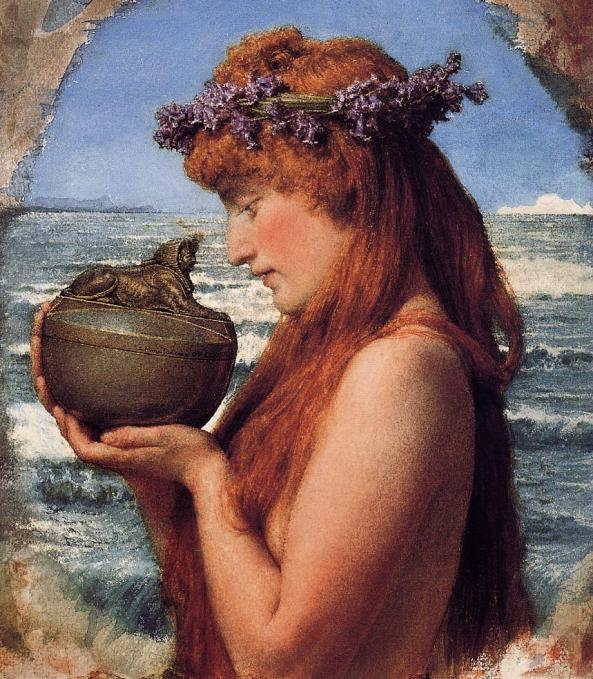Pandora Ancient Greek mythological creature

Pandora was the first mortal woman in Greek mythology, a sort of an Ancient Greek Eve. Following the instructions of Zeus – who wanted to punish Prometheus for stealing the fire from the gods and giving it to the humans – she was molded by Hephaestus and endowed with gifts by all the other Olympian gods. One of these gifts was a jar full of all the evils and diseases which exist in the world; once Pandora married Epimetheus, she lifted the lid of this jar and set them all free, thus marking the end of the Golden Age of Humanity.
The Creation of Pandora
Pandora, the first woman, was created by Zeus to neutralize the blessing of fire, which had been stolen by Prometheus from Olympus.
The Balancing Gift
After Prometheus stole the fire from Olympus and brought it back to earth in a fennel stack, the angered Zeus decided to give humans something which would balance this new acquisition, “an evil thing for men as the price of fire.” So, he asked Hephaestus to create a creature endowed with numerous beguiling and seducing gifts which would plague humanity from then on.
The Olympians Create Pandora
Hephaestus threw himself to work almost instantly. He mixed some earth with water and fashioned from the mixture “a sweet, lovely, maiden-shape, like to the immortal goddesses in face.” Athena dressed this new being in a beautiful silvery gown, and taught it needlework and weaving. Then, Aphrodite joined in, adding some elegance and longing to the mix. The Graces and Peitho (Persuasion) gifted the being with golden necklaces, and the rich-haired Horae placed a flowery garland upon its head. Finally, Hermes put in it the voice of humankind and, at the will of Zeus, contrived within this voice many lies and crafty words.
Pandora, the First Woman
It was a masterwork for the ages this being, so beautiful and devious at the same time that wonder took hold of the deathless gods themselves! They called it Pandora, meaning the “All-Endowed,” because each of the gods who dwell on Olympus gave it some kind of a gift. Of her, writes Hesiod “is the deadly race and tribe of women who live amongst mortal men to their great trouble, no helpmeets in hateful poverty, but only in wealth.”

The Jar of Pandora (“Pandora’s Box”)
Now, it seems that the “sheer guile” of Pandora wasn’t enough of a punishment for mankind. So, the gods also bequeathed her with numerous other gifts – plagues and evils to men who eat bread – which they packed neatly in a beautiful jar, her supposed dowry. With the jar in hand, Pandora was given in marriage to Epimetheus, Prometheus' brother, who accepted the divine gift despite his brother's warnings to never take a gift from Olympian Zeus.
One day – out of curiosity and not out of malice – Pandora lifted the lid of the jar, thus instantaneously releasing all evils and diseases into the world. Shocked by what had happened, she quickly tried to put the lid back, managing to merely trap Hope inside it. That is why Hope is the last thing that dies in man: even though deceitful from time to time, it is the only consolation humans have for all the troubles Pandora let loose on the world.
The event of their release marks the end of the trouble-free Golden Age of Man, and the beginning of the Silver Age, the second of the five Ages of Man.